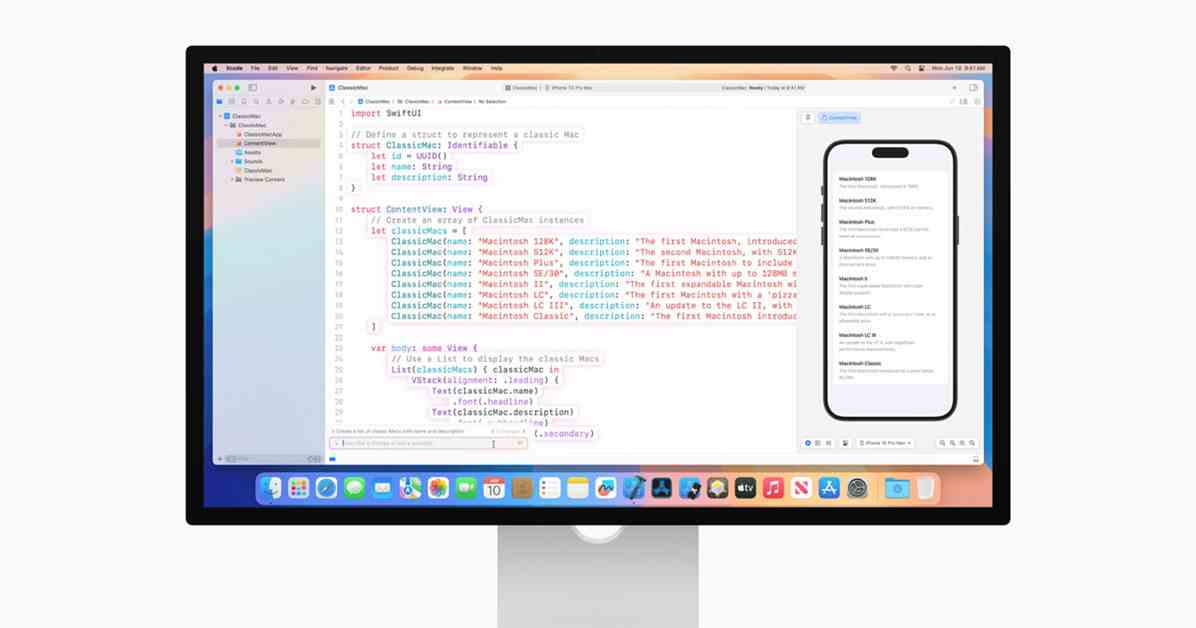Apple Empowers Developers and Drives Innovation with New Tools and Resources
Apple has unveiled new tools and resources that empower developers worldwide to create more powerful and efficient apps across all Apple platforms. With improvements to Xcode and Swift, along with new APIs, developers now have more capabilities to create high-quality apps.
In Cupertino, California, Apple introduced innovative tools and resources that enable developers worldwide to create more powerful and efficient apps across all Apple platforms. With Xcode 16, developers can save time in the development process and accomplish more in less time thanks to features like Swift Assist and the ability to predictively complete code. Expanded APIs provide developers with the tools they need to enhance their apps and incorporate amazing functionalities.
«At Apple, we are dedicated to providing developers worldwide with cutting-edge technologies and resources to create amazing apps,» says Susan Prescott, Vice President of Worldwide Developer Relations at Apple. «With innovation tailored specifically for Xcode 16 and our latest platform APIs, we have created the best tools for developers to design stunning apps. We are excited to see what their next creations will be.»
Xcode 16 sets a new standard for developer productivity, offering features and performance improvements that allow developers to create exceptional apps faster than ever. Swift Assist guides developers through all programming tasks so they can focus on complex problems and solutions. Integrated seamlessly with Xcode and knowledgeable about the latest software development kits (SDKs) and Swift language features, developers will always have access to the latest programming to seamlessly adapt it to their projects. With Swift Assist, tasks like exploring new environments and experimenting with new ideas are just a request away.
The new predictive code completion engine in Xcode uses a uniquely trained model specifically for Swift and Apple’s SDKs, suggesting the code developers need. The code completion functionality leverages the power of Apple’s chips and improvements in macOS Sequoia’s machine learning. Additionally, it runs locally on the developer’s device, ensuring that the code is saved completely privately, and developers can receive relevant suggestions quickly even when working offline.
Xcode’s Previews now offer a new dynamic linking architecture that uses the same build artifacts for both previews and code execution, resulting in a smoother and more productive workflow when transitioning between the two. Additional improvements to testing environments in Xcode 16 make it easier than ever for developers to see how their apps perform in real conditions from the moment they start building them.
Swift 6 introduces new capabilities to enhance developer productivity and code clarity. As multi-core architectures increase the power of devices, Swift constantly incorporates features to facilitate concurrent programming. Swift 6 includes compile-time data race safety, which diagnoses concurrent memory access throughout the project at compilation time. This advancement allows for error detection and correction with minimal changes to the entire codebase, improving code security and ease of future maintenance.
The WWDC24 marks the tenth anniversary of Swift. Since its launch, Swift has empowered developers to create high-quality experiences across the Apple ecosystem. Today, nearly a million apps use Swift, and it is utilized in all of Apple’s software, from apps and environments to firmware like Secure Enclave.
A decade later, Apple maintains its strong commitment to promoting the capabilities of Swift and collaboration within the developer community. Apple expands the availability of Swift to a broader range of developers and programmers, with support for additional code editors leveraging the language server protocol. Fostering this expansion, a new GitHub organization dedicated to Swift will host a series of core projects for the Swift ecosystem, such as the Swift compiler, Foundation, and other key libraries.
Swift Test
The new Swift testing environment offers developers expressive APIs that make test writing easier. As it is cross-platform and easy to learn, developers can use it to write tests for different platforms and domains. The environment also includes a flexible labeling system that allows them to organize their tests and test plans. Swift Test is designed for many of Swift’s use cases, from apps to servers.
Game Porting Toolkit 2
Since the introduction of the Game Porting Toolkit, developers have had the opportunity to bring their games to Apple devices faster than ever, allowing gamers to enjoy more titles on the Mac. With Game Porting Toolkit 2, this experience reaches a new level with some of the most requested capabilities by game developers, making it easier to bring advanced games to the Mac, iPhone, and iPad. Game Porting Toolkit 2 saves a lot of time when adapting existing or in-development games to Apple devices. Thanks to improved compatibility with Windows games, new and powerful shader debugging tools, and updates to Xcode that unify game code and shaders for multiple devices, creating amazing games for the iPhone, iPad, and Mac has never been easier.
visionOS 2
The Apple Vision Pro continues to attract developers worldwide, who leverage its unique capabilities to create new spatial experiences. All thanks to visionOS, the revolutionary spatial operating system that seamlessly merges digital content with the physical world. visionOS 2 brings new APIs and environments that help developers create complex and nuanced spatial experiences that were previously impossible.
With the new volumetric APIs, developers have more control over how 3D objects appear in their apps. Additionally, they allow running complex spatial apps in parallel to provide a new level of multitasking experience. TabletopKit enables developers to create experiences in spatial apps based on flat surfaces, such as manufacturing stations or board or card games. RealityKit simplifies the development of apps compatible with various Apple devices, as it reduces development times and increases workflow efficiency for universal apps.
Developers can create incredible immersive environments for their apps thanks to the new APIs, tool improvements, and streamlined development process. And now it’s even easier to develop amazing SharePlay spatial experiences. Additionally, developers who do not have Apple Vision Pro can now create and preview SharePlay-based apps in Simulator. visionOS is compatible with HealthKit, allowing apps to access and share health data privately and securely.
Thanks to the new enterprise APIs, businesses and developers will be able to enhance their workflows in sectors such as health, manufacturing, aerospace engineering, automotive industry, and many more.
Other Platform APIs
Developers can leverage the new Controls API so that users can do much more from more places, like quickly opening the car door or launching their favorite third-party app camera from Control Center.
And with AccessorySetupKit, developers can easily and securely connect Bluetooth accessories from their app without having to give access to all nearby Bluetooth accessories and keeping other devices hidden.
With updates to the Smart Stack of the Apple Watch, developers can now build on indicators such as date and time, location, wake-up or sleep time for their apps to display as suggested widgets. And for the first time, Live Activities supported apps will automatically appear on the Apple Watch.
Developers now also have access to the new double-tap API for watchOS, which allows them to assign the gesture to key functions of the app experience on the Apple Watch.
TestFlight
With TestFlight, developers can gather valuable feedback from beta testers to improve their apps during the development and release process. Thanks to enhancements in TestFlight invitations and logs, developers can invite people to test an app based on their device and operating system, receiving more relevant feedback to improve it.
TestFlight invitations will include the description of the beta app, its category, and optional screenshots highlighting new features and content to potential reviewers. Developers will have new metrics to assess participation through public links and see which invitations were accepted or rejected.
App Store
For over 15 years, Apple has been dedicated to paving the way for developers to distribute their apps and games to people worldwide and grow their businesses. This year, the App Store adds new options for developers to promote their apps, as well as new features to monetize them with subscriptions.
The new nomination features allow developers to easily nominate upcoming content and improvements for their apps to be featured on the App Store. These nominations can be submitted in App Store Connect along with information such as the publication date and relevant countries or regions. The App Store’s expert editorial team evaluates submitted entries to connect amazing apps and games with the right people.
And with personalized product pages, developers can showcase the different features and content that will be available in their apps. In addition, thanks to personalized product pages now featuring deep links, developers can easily redirect people from a custom product page on the App Store to a specific section within their apps. Deep links can also be used in Search Ads campaigns to provide a seamless experience for users from what they see in an ad to where they enter the app.
For subscription apps, developers can incentivize people who have canceled their subscription to renew it with new offers designed to attract them back. Customers who meet the requirements will discover these offers on the App Store and within the apps themselves. And on macOS, developers will be able to offer discounts or subscriptions for a period of time with offer codes to acquire and retain new subscribers or re-attract those who canceled their subscription.
The improvements introduced in StoreKit views provide developers with new options to organize and present purchases within apps.
App Analytics has also expanded to offer developers more insights into their business and app performance. Reports now include hundreds of new metrics that help developers identify improvement opportunities.
App Store Connect
The App Store Connect app for iOS and iPadOS brings an updated user interface and incorporates a new way for developers to promote the best moments of their apps. From launching a new app to announcing a major update, developers can now easily create marketing material in App Store Connect and share it on their social networks. When an app is promoted as App of the Day, developers receive a push notification from App Store Connect inviting them to create unique marketing material to commemorate the moment.
All these updates add to an increasingly broad set of tools, technologies, and resources that Apple puts into developers’ hands. For more information on key technologies and amazing features that are already available, visit developer.apple.com/whats-new.





